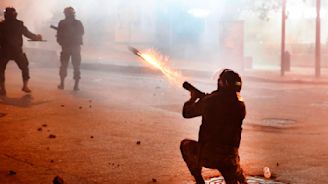It’s possible that I shall make an ass of myself. But in that case one can always get out of it with a little dialectic. I have, of course, so worded my proposition as to be right either way (K.Marx, Letter to F.Engels on the Indian Mutiny)
Wednesday, January 15, 2020
Could these ancient mummies be descended from Atlanteans?
13 JANUARY 2020|HISTORY
The Guanches were the first known inhabitants of the Canary Islands, but their true origins have baffled archaeologists.
Their mummification rituals saw them linked to the Ancient Egyptians, and some legends suggested they could even have been surviving inhabitants of Atlantis. New scientific evidence, however, may have found the truth.
Video by Fernando Teixeira & Izabela Cardoso
Follow BBC Reel on Twitter for all our latest videos and exclusive content.
BBC Reel
SNOWNADO***
Snow, hurricane-force winds coming as icy cold grips B.C. Environment Canada warns of hurricane force winds and freezing spray in Howe Sound
CBC News · Posted: Jan 14, 2020

As bone-chilling Arctic air continues to seize the region, a snowfall warning is in effect for Metro Vancouver, which could see up to 15 centimetres by Wednesday morning.
A few more centimetres of snow is expected to fall Wednesday in the Lower Mainland and the Fraser Valley. Environment Canada has also issued snowfall warnings or special weather statements for much of Vancouver Island, the southern Gulf Islands and the Sunshine Coast.
In Howe Sound, forecasters are warning of hurricane force winds of 45 to 55 knots early Wednesday, speeding up by the late afternoon to 55 to 65 knots. A freezing spray warning is also in effect.
Environment Canada is urging drivers to prepare for deteriorating road conditions that could have a "significant" impact on rush hour traffic.
All classes at the University of the Fraser Valley in Abbotsford are cancelled Tuesday due to reduced bus service and "treacherous" driving conditions, the school said in an emailed statement.
The SUS shuttle but will not be operating past 4:30 p.m. but the school has hired a private coach for students travelling between Abbotsford and Chilliwack.
The school's buildings will remain open.
Meanwhile, forecasters say the cold spell will ease up soon, though they warn milder conditions coming Friday could lead to a "messy" end to a slushy week on the South Coast.
A return to rain
The reprieve is expected to begin on Wednesday. Temperatures across the province will creep back toward 0 C on the Lower Mainland, according to Environment Canada. More seasonal temperatures for the Interior are due across B.C. by the weekend.
Environment Canada said extreme cold warnings across the province are expected to remain in place Tuesday before the current system moves on. The South Coast, where daffodils had begun to bloom last week, will face another round of below-zero temperatures and up to 10 centimetres of snow Tuesday night.
Central, northern areas of B.C. facing -40 C as frigid snap grips the province
Forecasters said Friday will be the "transition day" on the South Coast. Bitterly cold, snowy air is expected to shift back to characteristic downpours.
Parts of the region can expect around 40 millimetres of rain on Friday, which isn't good news given the amount of snow the area has seen this week.
"It will be rain on snow, and that has caused the Lower Mainland and South Coast problems in the past," Environment Canada meteorologist Armel Castellan sai
Rain-soaked snow weighs heavily on structures, particularly weaker ones like sheds and outbuildings. Dense, saturated snow could also down power lines and cause another round of outages.

B.C.'s cold spot hits –48 C
With the wind chill, temperatures along the North Coast have tumbled to –20 C, while the weather office said conditions have felt closer to –40 C near Prince George and –45 C along the boundaries with Yukon and northwestern Alberta.
Castellan said Puntzi Mountain in the Cariboo-Chilcotin region plummeted to –48 C Tuesday morning, only one degree shy of the coldest place in Canada.
More seasonal temperatures for the Interior are due by the weekend.
Severe winter shelters are open across the province for those who are homeless.
Jeremy Hunka, spokesperson for the Union Gospel Mission in Vancouver, said many people living outside begin to get sick when the weather gets cold, and donated waterproof boots and jackets, as well as dry bedding, can make a huge difference.

Snow, hurricane-force winds coming as icy cold grips B.C. Environment Canada warns of hurricane force winds and freezing spray in Howe Sound
CBC News · Posted: Jan 14, 2020

Snow at Kitsilano Beach in Vancouver, B.C., on Jan. 13, 2020. (Ben Nelms/CBC)
As bone-chilling Arctic air continues to seize the region, a snowfall warning is in effect for Metro Vancouver, which could see up to 15 centimetres by Wednesday morning.
A few more centimetres of snow is expected to fall Wednesday in the Lower Mainland and the Fraser Valley. Environment Canada has also issued snowfall warnings or special weather statements for much of Vancouver Island, the southern Gulf Islands and the Sunshine Coast.
In Howe Sound, forecasters are warning of hurricane force winds of 45 to 55 knots early Wednesday, speeding up by the late afternoon to 55 to 65 knots. A freezing spray warning is also in effect.
Environment Canada is urging drivers to prepare for deteriorating road conditions that could have a "significant" impact on rush hour traffic.
All classes at the University of the Fraser Valley in Abbotsford are cancelled Tuesday due to reduced bus service and "treacherous" driving conditions, the school said in an emailed statement.
The SUS shuttle but will not be operating past 4:30 p.m. but the school has hired a private coach for students travelling between Abbotsford and Chilliwack.
The school's buildings will remain open.
Meanwhile, forecasters say the cold spell will ease up soon, though they warn milder conditions coming Friday could lead to a "messy" end to a slushy week on the South Coast.
A return to rain
The reprieve is expected to begin on Wednesday. Temperatures across the province will creep back toward 0 C on the Lower Mainland, according to Environment Canada. More seasonal temperatures for the Interior are due across B.C. by the weekend.
Environment Canada said extreme cold warnings across the province are expected to remain in place Tuesday before the current system moves on. The South Coast, where daffodils had begun to bloom last week, will face another round of below-zero temperatures and up to 10 centimetres of snow Tuesday night.
Central, northern areas of B.C. facing -40 C as frigid snap grips the province
Forecasters said Friday will be the "transition day" on the South Coast. Bitterly cold, snowy air is expected to shift back to characteristic downpours.
Parts of the region can expect around 40 millimetres of rain on Friday, which isn't good news given the amount of snow the area has seen this week.
"It will be rain on snow, and that has caused the Lower Mainland and South Coast problems in the past," Environment Canada meteorologist Armel Castellan sai
Rain-soaked snow weighs heavily on structures, particularly weaker ones like sheds and outbuildings. Dense, saturated snow could also down power lines and cause another round of outages.

A man walks by palm trees covered in snow in Vancouver on Jan. 13, 2020. (Ben Nelms/CBC)
The weather agency said localized flooding is also possible, as drains blocked with snow won't be able to handle the rain.
"It's going to be a pretty messy end to the week," Castellan said.
Snowy struggle
Weather conditions in recent days have led to travel nightmares across the province, particularly in the Lower Mainland and on Vancouver Island.
A sudden blast of blowing snow across the area Sunday caused dozens of crashes, delays or closures on several highways and bridges, while as much as 25 centimetres of snow forced a number school districts — mainly in the Fraser Valley — to cancel classes on Monday. Ferries between the mainland and Vancouver Island were also called off due to wind.

The weather agency said localized flooding is also possible, as drains blocked with snow won't be able to handle the rain.
"It's going to be a pretty messy end to the week," Castellan said.
Snowy struggle
Weather conditions in recent days have led to travel nightmares across the province, particularly in the Lower Mainland and on Vancouver Island.
A sudden blast of blowing snow across the area Sunday caused dozens of crashes, delays or closures on several highways and bridges, while as much as 25 centimetres of snow forced a number school districts — mainly in the Fraser Valley — to cancel classes on Monday. Ferries between the mainland and Vancouver Island were also called off due to wind.

Snow clearing on certain highways in Metro Vancouver, including Highway 1, are the jurisdiction of the B.C. government, but the rest are the responsibility of cities. (Ben Nelms/CBC)
Morning commuters were warned to watch their speed on Monday and Tuesday as icy roads caused a number of vehicles and semi-trailers to lose control on major highways, including Highway 1, the Malahat Highway and the Coquihalla Highway.
Side streets and sidewalks were also treacherously slick.
Morning commuters were warned to watch their speed on Monday and Tuesday as icy roads caused a number of vehicles and semi-trailers to lose control on major highways, including Highway 1, the Malahat Highway and the Coquihalla Highway.
Side streets and sidewalks were also treacherously slick.
B.C.'s cold spot hits –48 C
With the wind chill, temperatures along the North Coast have tumbled to –20 C, while the weather office said conditions have felt closer to –40 C near Prince George and –45 C along the boundaries with Yukon and northwestern Alberta.
Castellan said Puntzi Mountain in the Cariboo-Chilcotin region plummeted to –48 C Tuesday morning, only one degree shy of the coldest place in Canada.
More seasonal temperatures for the Interior are due by the weekend.
Severe winter shelters are open across the province for those who are homeless.
Jeremy Hunka, spokesperson for the Union Gospel Mission in Vancouver, said many people living outside begin to get sick when the weather gets cold, and donated waterproof boots and jackets, as well as dry bedding, can make a huge difference.

The flag held by Mr. PG, the towering wooden mascot standing over Prince George, B.C., was frozen in the cold on Monday. (Andrew Kurjata/CBC)
***SNOWNADO YES I KNOW ITS NOT A TORNADO, BUT SNOWCANE REALLY?
***SNOWNADO YES I KNOW ITS NOT A TORNADO, BUT SNOWCANE REALLY?
Lebanon protesters hit banks in 'week of wrath'
Banks in Beirut were targeted by demonstrators during what they have called a 'week of wrath', in protest against the country's banking crisis.
Protests have been ongoing since October 2019. Lebanon's commercial banks have been restricting savers' access to their deposits and blocking most transfers abroad for more than two months.
Protesters say they will continue to take to the streets until a new government is formed.
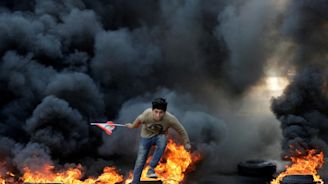
Lebanon in 'week of wrath' protests over political, economic crisis
AFP via Yahoo News· 15 hours agoAlthough protests had declined in size in recent weeks, demonstrations have been ongoing since...
Pitched clashes near Lebanon's central bank amid protests
Associated Press via Yahoo News· 1 day agoLebanese security forces fired volleys of tear gas at protesters who responded with rocks outside...
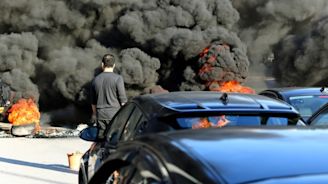
Lebanese resume protests demanding end to political vacuum
AFP via Yahoo News· 1 day agoLebanese protesters resumed blocking major highways on Tuesday in what they said would be a "week of...
Australia fires: Family blames teenager’s death on bushfire smoke
- 9 hours ago
Related Topics
 Image copyrightPARTRIDGE-MCLENNAN FAMILY
Image copyrightPARTRIDGE-MCLENNAN FAMILY
One night last November, Courtney Partridge-McLennan said goodnight to her family in Australia and went to sleep in her room.
At some point in following hours, the 19-year-old woman suffered a suspected asthma attack. When her parents checked on her the next morning, Courtney had died.
Her family believes that Courtney's death in Glen Innes, New South Wales, was triggered by smoke from nearby bushfires. Like many populated areas across Australia's east, the town has been shrouded by smoke in recent months.
"She was found with her phone torch on, as though she was looking for something," her sister, Cherylleigh, told the BBC's Outside Source programme. "Her Ventolin [inhaler] was on the bed with her."
Courtney was diagnosed with asthma as a child. It was not usually severe but tended to flare up around dust and air pollutants, according to her sister.
"She had no symptoms before she went to bed," Cherylleigh said.
"She was healthy and that's what made it the biggest shock for us. It was so out of nowhere."
Cherylleigh said preliminary autopsy reports had listed the cause of death as "unconfirmed". But she added her parents had been told that Courtney had a "hyper-extension of the lungs" - one indicator of an asthma attack.
"Initially when they found her, the comments were, 'oh it definitely looks like an asthma attack, it looked like it happened really quickly,'" Cherylleigh said.
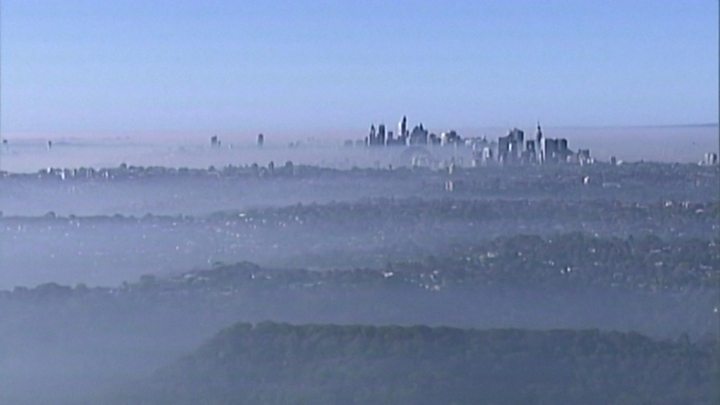
According to health officials, asthmatics are particularly vulnerable in Australia's ongoing bushfire crisis. The condition narrows a person's airways when triggered by irritants in the air.
In recent months, cities including Sydney, Melbourne, Canberra and Adelaide have recorded some the worst air quality readings globally.
In rural communities closer to the fire-zones, the impact has been even greater.
A fortnight before Courtney's death on 28 November, bushfires ripped through Glen Innes, causing the deaths of two people.
But fires had burned in the region since September, and smoke continued to affect the town afterwards. Her family believes this was the trigger for her asthma attack.

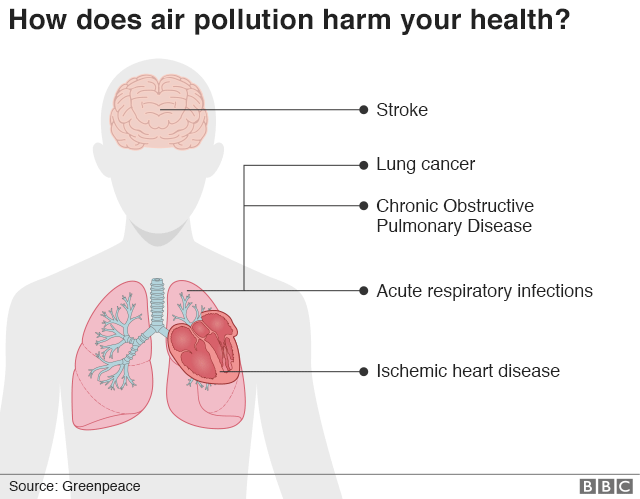

Health officials have consistently warned of the dangers of bushfire smoke, urging those with asthma - about one in nine Australians - to carry their treatments with them.
"It can be a really frightening experience when [one is] exposed to triggers like bushfire smoke," said Michele Goldman from advocacy group Asthma Australia.
"They can experience breathlessness and wheezing, and symptoms can quickly deteriorate into a very serious asthma attack which can be fatal."
She fears that because the condition is common, and often mild, there is a sense of complacency - even amid the unprecedented smoke.
Cherylleigh said Courtney had been studying to be a youth worker, and had been passionate about helping others.
"For us, it's about getting people aware that asthma is this serious," Cherylleigh said.
"Courtney's death was not an isolated incident."
Related Topics
Is it OK to call in sick with a common cold?
AS A PROFESSIONAL IN THE FIELD OF INDOOR ENVIRONMENTAL HEALTH
THOSE IN OUR INDUSTRY HAVE LEARNED THAT YES IT IS
By Ian ShoesmithBBC News
- 15 January 2020
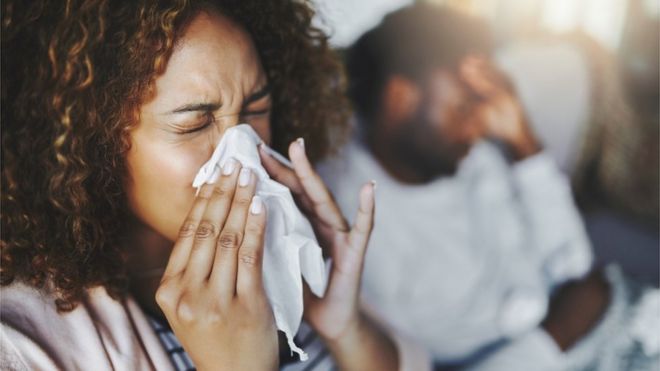 Image copyrightGETTY IMAGES
Image copyrightGETTY IMAGES
"For goodness sake, just go home," my boss implored. "People are complaining and don't want to catch your disgusting germs!"
My protests of "it's just a cold - I don't feel that bad" fell on deaf ears and I had to admit defeat gracefully rather than being frogmarched out of the newsroom.
While I wasn't feeling 100%, in my mind I certainly wasn't poorly enough to justify spending an afternoon under a duvet.
But forget Brexit - nothing seemed to divide my friends, colleagues and random social media posters more than the thorny question of whether you should call in sick with the sniffles.
Opinions varied from "oh, for heaven's sake, just grow a pair" via "ooh, that's a really tricky one..." to "how very dare you infect your poor colleagues, you selfish..."
And so I found myself entering the murky moral maze that brought together employment law, ethics and public health.
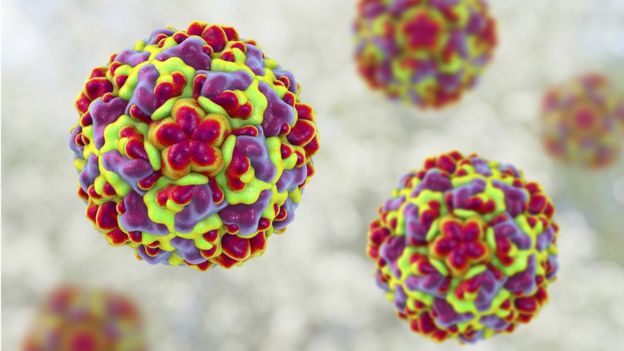 Image copyrightGETTY IMAGES
Image copyrightGETTY IMAGESWhen is a cold more than a cold?
Colds are everywhere - on the tram, in the supermarket, in the playground. So unless you plan on not leaving the house EVER, someone will infect you.
So why are so many people agitated, I wondered to myself? Surely it's just part of winter?
"Colds are viruses and we react differently to them - we can't underestimate how lousy some people feel with a cold," said Rachel Suff, senior policy adviser at the Chartered Institute of Personnel and Development (CIPD).
"If you are really not well and your symptoms mean you are not going to be productive, it's better to go off sick. You're also not spreading your germs around the workplace."
Prof Martin Marshall, chair of the Royal College of General Practitioners, agreed that "every patient is different, and each one experiences illness differently".
But should we all be desperately trying to avoid colds? Aren't they great at building up our immune systems?
Prof Peter Openshaw, former president of the British Society of Immunology, who has done research in this area for more than 25 years, says colds can be good for our long-term health, but only sometimes.
It turns out there are "good colds" and "bad colds".
"It's my life-long quest to find out which viruses are 'good'," he said, "because some colds seem able to put your immune system through some kind of training course."
What about those with compromised immune systems?
One former colleague told me: "When my mum was seriously ill [with cancer], I got a chest infection after a colleague was ill and couldn't see her for three weeks and had to get carers."
While she conceded that she "could have got it from anywhere... I can guarantee being next to someone sneezing all over the desk didn't help!"
Prof Marshall suggests people, particularly if they are in caring roles, should "take into account factors such as... whether they are likely to come into contact with vulnerable groups, such as young children, pregnant women, or the elderly".
Hayley Johnson, an employment lawyer at Slater and Gordon, also pointed out the implications [of catching a cold] for people with cystic fibrosis or who have recently had chemotherapy, for example, can be incredibly serious.
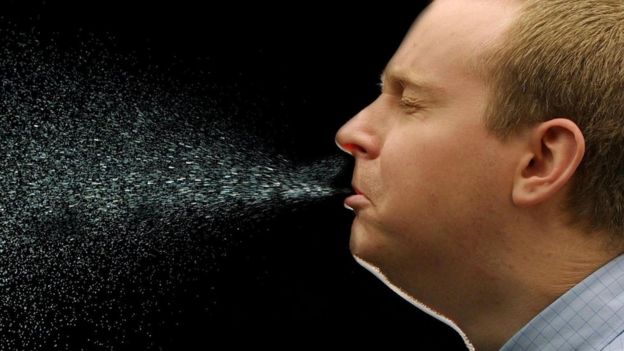 Image copyrightPA MEDIA
Image copyrightPA MEDIAHave attitudes shifted in recent years?
It would seem so.
The CIPD reported the typical employee's number of sick days dropped to 5.9 in 2019 - the lowest in the 19-year history of its annual survey of UK HR professionals.
That may explain why 83% of them have observed people going to work when they were ill. Or that 63% had witnessed colleagues working while on annual leave.
It's all tied up in workplace culture, said Ms Suff. "We know a lot of people can't cope with their workloads... People know that by not being there, there will be extra work for their colleagues."
Ms Johnson said that in recent years employers have tended to be "much more across sickness records" than previously, especially when it comes to "frequent, intermittent absences" of a few days here and there.
She thinks this is because "budgets are so tight nowadays that you've often got every employee doing the work of one and a half people".
Sometimes members of staff feel obliged to work when they are sick "because they fear the mountain of work will just keep piling up" for when they return.
Should your decision depend on who you work for?
"When somebody's got a cold, we send them home," said Paul Knowles, from Acoustic and Engineering Consultants Ltd in Marple, Cheshire.
"There are only six of us and so if three or four catch it and can't work, we are struggling to keep our clients happy."
Mike Cherry, national chairman of the Federation of Small Businesses (FSB), urged those working for smaller companies not to be scared to talk to their boss.
"Nine in 10 small employers offer flexible working arrangements," he said.
"So in situations where a member of staff is feeling under the weather - but still well enough to get stuff done - it can be more straightforward to arrange a day working from home."
Finally, we should all spare a thought for freelancers and the self-employed, Mr Cherry said.
"The luxury of statutory sick pay is not available [so] the tendency to just crack on with it - for better or worse - is much more prevalent among sole traders."
Could I get sacked for calling in sick with 'just a cold'?
"Ultimately employees don't have to be bed-bound to be unfit for work," said Ms Johnson. "GPs are quite happy to sign people off with what many people would regard as a low-level virus.
"In my 10 years' experience as an employment lawyer I've only once seen a policy that says you need a sick note in all circumstances. Most say they are only required for five days or more."
She suggests a pragmatic, common-sense approach, based upon mutual trust.
"Employers can sack people who they think are lying," she said, giving a hypothetical example of "somebody who calls in sick but then posts photographs of themselves [on social media] having afternoon tea with prosecco!"
But the fact so many employers are willing to take their employees' word for genuinely being sick suggests there is at least a basic level of trust.
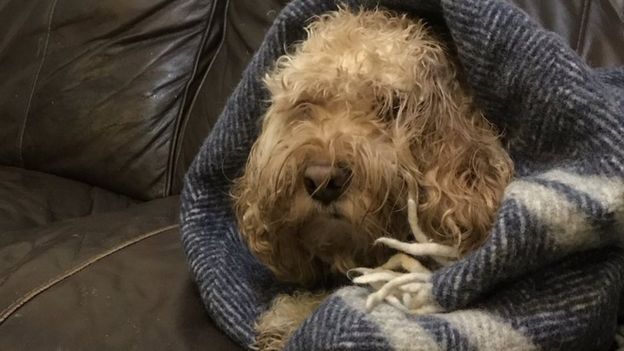 Image copyrightIAN SHOESMITH
Image copyrightIAN SHOESMITHSo what have I learned?
From examining all of the issues involved, I've come to the conclusion that maybe I should count my blessings, and be more mindful of those with severely compromised immune systems.
And if I am horribly infectious but not feeling too bad, perhaps I should be kind to myself - and everybody around me - by working from home until the lurgy blows over.
At least my dog Biscuits will be happy to see me...
Subscribe to:
Posts (Atom)
